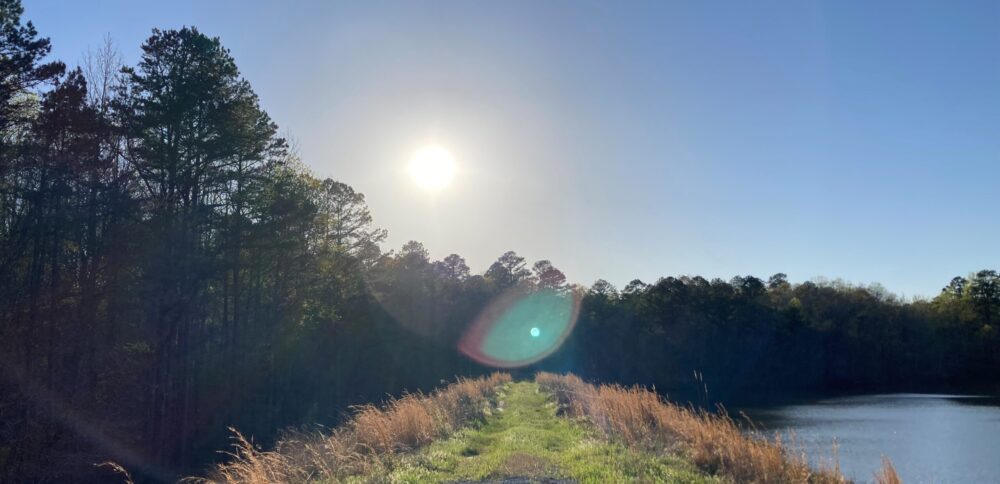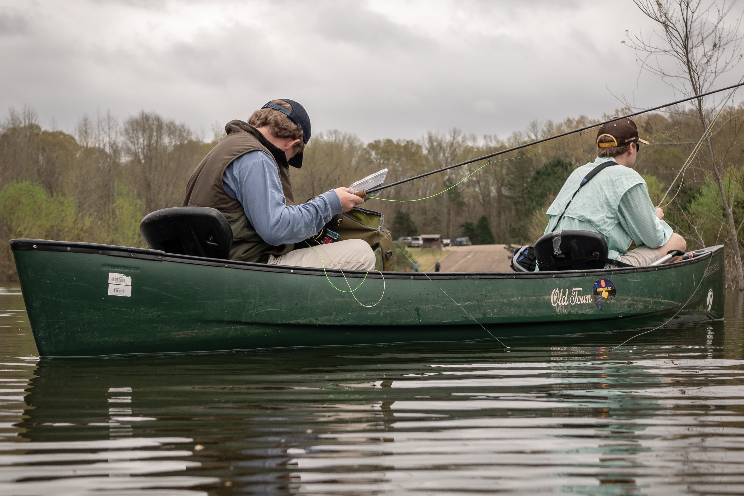From a distance, I could hear the poetic question carried by a southern drawl, “you know there’s no trout in here, right?”
As it turns out, I did know that. It actually wasn’t the slurping sound of a nice rainbow lazily munching on my closest callibaetis imitation that provoked me to drive down to the river 15 miles south of my college home. Trout couldn’t survive in the Yocona River—probably not even in the lower water temperatures of a cloudy day in March. It’s just too hot. Passing the blooming dogwoods on the drive out of town made me smile. It can be taken as the first real indicator of spring and, more importantly, that the white bass run is starting.
Heavy rains had been a nuisance, and the water levels were less than ideal. Mother Nature’s mood swings can result in frustrating outcomes. High water was the situation, and it would stay that way until the Mississippi River dropped quite a bit. The Yocona feeds into Enid Lake, one of four Flood Damage Reduction Reservoirs in Mississippi. They exist to make sure the residents of the Mississippi Delta don’t have to take a canoe to church on Sundays.
The Army Corps of Engineers was just trying to manage the flooding. Yeah, yeah. I get it. Fishing wasn’t their first priority here, but it was mine. It is mine, so it was time to figure something out in spite of the blown-out rivers. This time, I wouldn’t be the only one to suffer a skunk if I couldn’t find the fish— Arthur, Matt, and Jack decided to tag along as well. The boat ramp was busy, and I was hopeful.
There were positive reports about the fishing from the confused and suspicious rural Mississippians. The scene of young guys at the boat ramp clad in “fancy” button-down fishing shirts boarding non-motorized watercraft loaded with fly fishing gear was more than enough to raise an eyebrow. Regardless, we eagerly took the good news and hit the water. The flies I tied up that morning were in poor taste, and I didn’t care. After encountering a local who was catching fish, and lots of them, the day before, I modeled a few flies after his jigs.
The boat ramp dropped us into a little canal turned river-of-its-own because the Yocona was so high, so we decided to take a few casts in the clearer water on the way to the big, muddier brother. First cast, nothing. Second cast, stuck one. White bass. It’s what we came for. Good start. After Arthur’s sixth or seventh cast from the front of the canoe, he hooked into his first ever white bass. Matt and Jack followed suit shortly after. With the first few under our belts and the danger of a skunk extinguished, we decided to make a break for bigger water.
Once we made the few-hundred-yards of a paddle to the main channel of the Yocona, we were met with pollen-covered water and winds that would knock shingles off a roof. After many fishless casts and a few close calls with unintentional bodily piercings courtesy of the flying hooks, we decided to head back into the calmer canal. We continued to stick a few more fish, adding white crappie to the list, and Arthur was able to land a nice white bass. We were all a little excited to see a good fish after a long off-season. Arthur, a merited trout fisherman with a nice gig guiding out West the coming summer, managed to let himself get a little stoked about the white bass run, especially since he was able to land the day’s trophy.
At some point during the day, we felt it. The success of the trip was evident, and there was a quiet wave of cheerfulness moving through the air. We were stuck in it, and that was alright.
Author’s note: This post was written prior to the escalation of the COVID-19 pandemic near our local waters. Please practice social distancing so we can all get out there together again soon.

Randolph Mikell is a Christ-follower and outdoorsman. A native Mississippian, Mikell decided to explore his local fly fishing scene. He found an unsurprisingly small number of fly anglers and a large number of fish willing to take flies. His time in the outdoors has brought about friendships and experiences that he cherishes continually.

